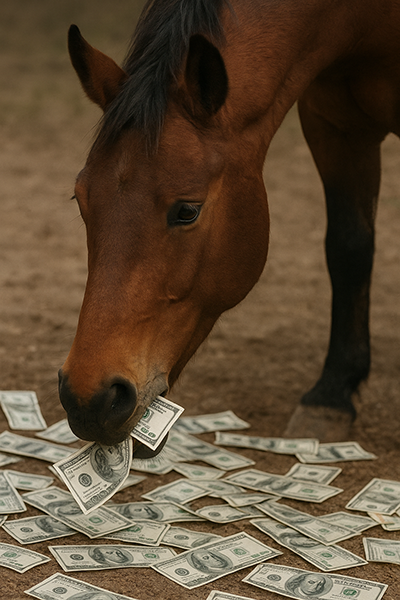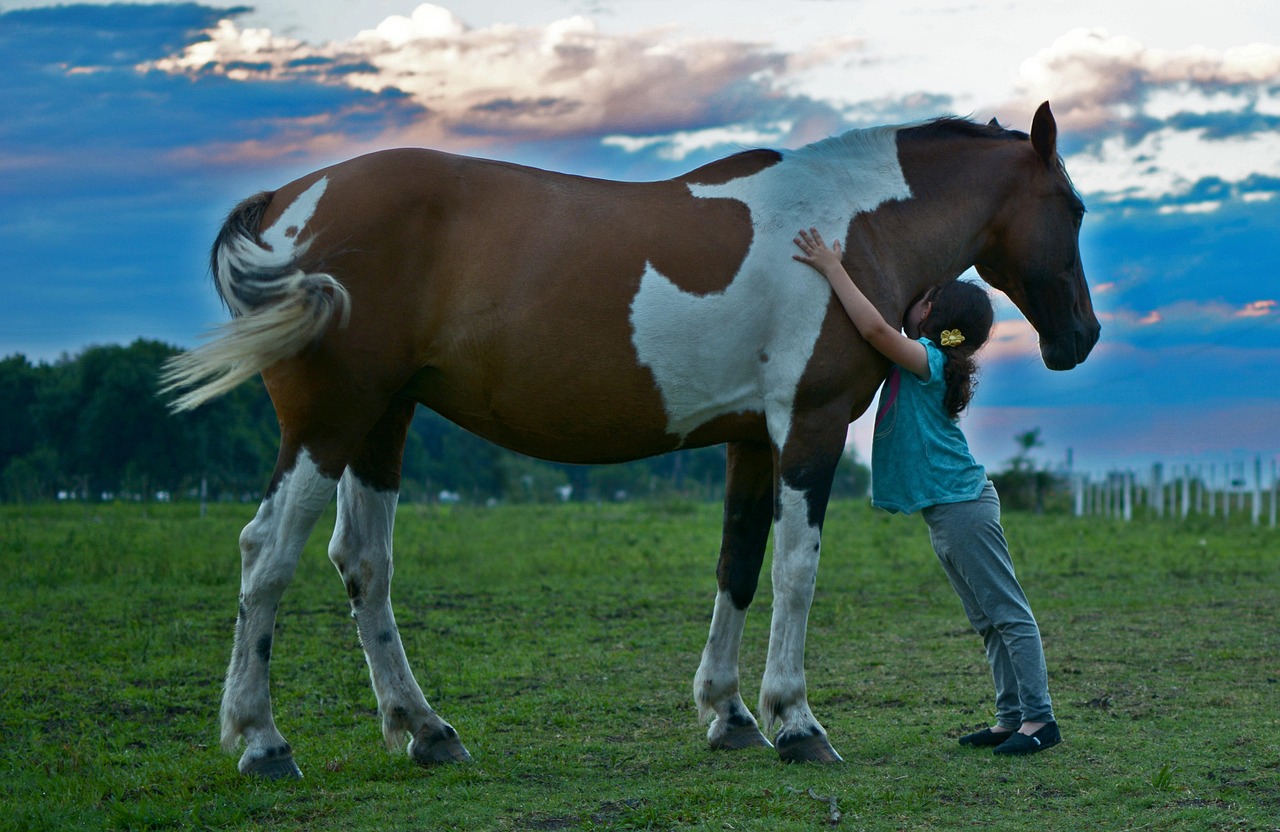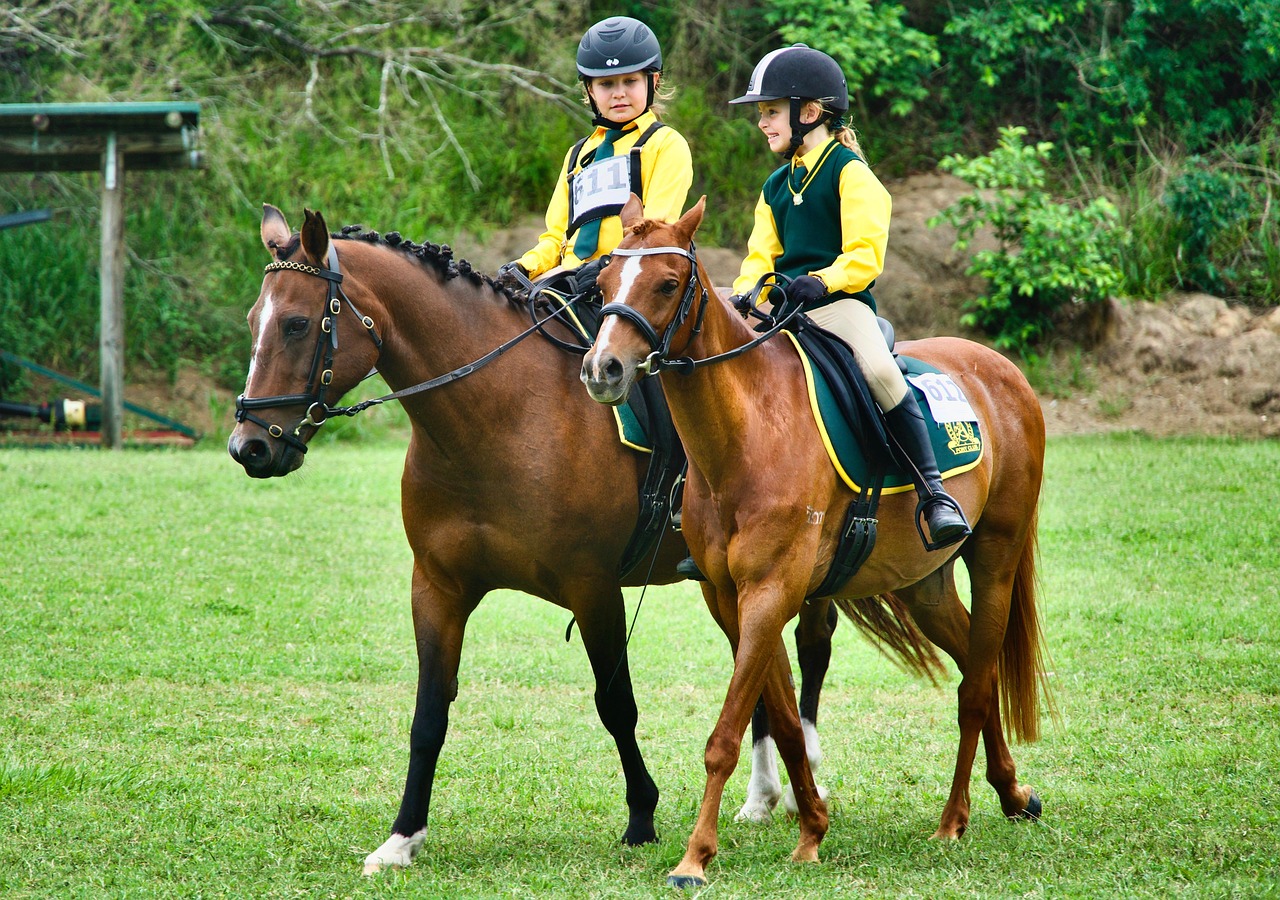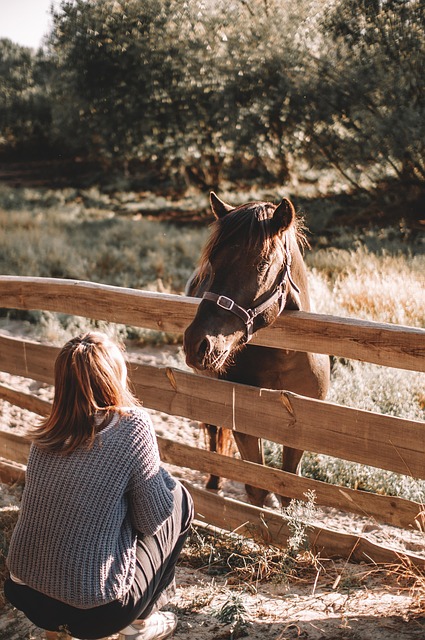Recreation & Lifestyle
Welcome to Recreation & Lifestyle, which includes leisure riding and other aspects of the equestrian lifestyle for you and your horse loving friends and family.
Looking for the perfect present? See the Gifts & Jewelry section. Redecorating? Find a Painting, Photograph or Sculpture in the Artwork section. Need to check out a movie or crawl up with a good book or magazine? See our Entertainment section where you will find and Books, Movies, Games, and Magazines. And don't forget about Fine Art in some specialty Museums that might surprise you.
Looking for love or a trail buddy? Riding Partners is the spot to seek other riders who share your passion. Find a place to ride with that special person in our Trail Riding section and if you need more time away, take a look at Vacations. Want to know about the next horse show or special event? Don’t miss it! Dates and locations are included in the Calendar of Events for Recreation & Lifestyle.
Do we need to add more? Please use the useful feedback link and let us know!

We've likely all had this conversation either with ourselves, parents or a significant other. How do I justify the cost of a horse? To justify the cost of a horse, here at Equine Info Exchange we emphasize the significant intangible benefits—like improved mental and physical health and community connection—rather than framing it as a financial investment. A financial-only justification is difficult because most recreational horses are not good investments and can be more expensive than anticipated. Yes, horses are very costly!
Instead, focus on the multifaceted returns of horse ownership, which go far beyond money.
Justifications based on personal and family well-being
- Boosts mental and emotional health: Interacting with and caring for a horse can reduce stress, lower blood pressure, and elevate mood. For many, the daily routine of barn chores offers a grounding, mindful experience that provides peace away from everyday obligations.
- Encourages an active lifestyle: Horse ownership inherently involves physical activity, from mucking stalls and grooming to riding and training. The physical demands of riding build core strength, balance, and coordination.
- Teaches responsibility and discipline: The daily care a horse requires instills discipline, patience, and problem-solving skills. This is especially beneficial for younger riders, who learn accountability through feeding, grooming, and health checks.
- Provides a path to social connections: The equestrian community is often tight-knit and welcoming. You can build friendships with fellow riders through local clubs, competitions, or simply by socializing at the barn.
- Fosters a deeper connection to nature: Owning a horse encourages more time outdoors, whether you're trail riding or simply working in the pasture. This offers fresh air and scenic views, and it promotes a healthier lifestyle.
Justifications based on potential financial offsets
While a horse is rarely a profitable financial investment, there are some ways to offset the costs:
- Offset expenses with property benefits: If you have suitable land, owning horse-friendly real estate can have hidden financial perks. In some areas, equestrian properties qualify for agricultural tax breaks.
- Generate income through services: For those with extra facilities, boarding other people's horses is a common way to generate income to help cover feed, maintenance, and property taxes. You can also offer training services, riding lessons, or leasing arrangements.
- In rare cases, a business investment: For those in the professional equestrian industry, such as high-level trainers, racers, or breeders, horses can be part of a larger business model. However, this path involves significant risk and is not a justification for the average owner.
The practical approach to making your case
- Do your homework and present a detailed budget: The most effective way to justify a horse is to show that you are fully prepared for the costs, both routine and unexpected. Research local boarding fees, feed costs, farrier services, and veterinary care to present a realistic, comprehensive budget.
- Plan for emergencies: Acknowledge that owning a horse includes unexpected expenses like medical emergencies. Demonstrate your readiness by budgeting for equine insurance or establishing a dedicated emergency fund.
- Explain the non-monetary benefits: Clearly articulate the specific personal and family benefits you will gain. For example, frame it as a way to reduce stress, get more exercise, or teach your children responsibility.
- Consider leasing first: If you're addressing a budget-conscious partner, suggest a horse lease as a first step. This provides much of the horse ownership experience for a fraction of the cost and commitment.
We hope this helps when thinking about purchasing a horse!
You can find more informative articles in our section on Recreation & Lifestyle. Take a look at our Curated Amazon Store for our selections in a wide variety of categories!

With the passing of Robert Redford, we’d like to share his lifelong love of horses. Robert Redford learned to ride a horse well enough to do his own stunts for Butch Cassidy and the Sundance Kid and later The Electric Horseman after Butch Cassidy was released. He developed a lifelong love of horses starting with a pony ride as a child, and his skill progressed as his career demanded more advanced riding abilities.
Childhood Experience
Redford's love for horses began at a young age, with his first experience being on a pony ride at ages five or six, which he described as "instant love".
Robert Redford starred in movies that featured horses, most notably The Horse Whisperer (1998), where he plays a horse trainer. He also starred in The Electric Horseman (1979) as a rodeo star who steals a racehorse. Even before these, he developed comfort on horseback while filming Butch Cassidy and the Sundance Kid.
Here are the specific films:
- The Horse Whisperer (1998)
Redford directed and starred as Tom Booker, a Montana horse trainer who helps heal a traumatic injury to a teenager's horse. - The Electric Horseman (1979)
In this film, Redford plays a down-on-his-luck rodeo rider who escapes with a valuable racehorse named "Rising Star". Redford was known to be attached to the horse from this film, taking it back to his Utah ranch after shooting. - Jeremiah Johnson (1972)
A biographical Western in which Redford plays the title character, a trapper who takes to the Rocky Mountains to live off the land. Horses are central to his survival and lifestyle in the wilderness. - Butch Cassidy and the Sundance Kid (1969)
While there's no record of Redford's role in this film specifically involving horses, he became very comfortable riding them during the filming of this 1969 movie.
While Robert Redford has not publicly stated a preference for a specific breed in his films, he did form a deep bond with a Thoroughbred named Let's Merge during the filming of The Electric Horseman.
Robert Redford's relationship with the Thoroughbred
- A lifelong companion. Redford grew so attached to the five-year-old bay Thoroughbred that he adopted the horse after filming was complete.
- His retirement. Let's Merge lived out the rest of his life on Redford's ranch in Utah.
Other horses in Redford's career
- Wild mustangs. Beyond his acting roles, Redford has been an outspoken advocate for wild horses. He was an executive producer for the 2020 documentary The Mustangs: America's Wild Horses, which follows mustangs on federal lands.
- Pilgrim. In The Horse Whisperer, the traumatized horse that Redford's character trains was actually played by several different animals.
Charitable Contributions
Robert Redford was a staunch supporter and friend of the wild horse sanctuary Return to Freedom, advocating for their conservation and protection from slaughter and advocating for humane management practices. He was also an executive producer of the documentary The Mustangs: America's Wild Horses and a co-founder of the Foundation to Protect New Mexico Wildlife, which opposed horse slaughterhouses.
Key Charities and Organizations
- Return to Freedom
Redford supported this organization, which runs a sanctuary for wild horses and burros and works on their conservation and advocacy. He was a passionate supporter of their efforts to provide a safe haven and protect the "freedom, diversity, and habitat of America's wild horses". - Foundation to Protect New Mexico Wildlife
Redford co-founded this organization with former Governor Bill Richardson, which aimed to block proposed horse slaughterhouses in New Mexico and Iowa.
Other Contributions
- Executive Producer of "The Mustangs"
Redford served as an executive producer for the documentary The Mustangs: America's Wild Horses, further highlighting his commitment to the cause. - Advocacy Against Horse Slaughter
He was a vocal opponent of the horse slaughter industry, describing it as "fundamentally un-American". Redford signed letters to Congress opposing plans to round up and slaughter wild horses and burros.
You can find more informative articles in our section on Recreation & Lifestyle. Take a look at our Curated Amazon Store for our selections in a wide variety of categories!

In the world of discerning collectors, custom superyacht owners are akin to owners of champion horses, fine art, and exclusive real estate through a shared focus on passion assets that represent exceptional craftsmanship, rare provenance, and elevated status. These high-value acquisitions offer owners more than just financial investment; they provide unique experiences, social access, and serve as expressions of personal identity and success.
Exclusive and passionate pursuits
- Passion vs. investment: For most owners, when you buy a superyacht—like acquiring a champion horse or fine art—is driven by passion rather than investment. Unlike a traditional investment, these purchases often depreciate in value, and owners understand that the true value lies in the experience, not in potential returns. With horses, the emotional payoff of seeing your own colors on a victorious horse can outweigh the financial risk.
- Bespoke craftsmanship: Each asset is entirely unique. Ocean Independence offers superyachts that are floating works of art, featuring bespoke design elements, custom interiors, and unique technological innovations. A fine art collection is also unique, while a champion horse has a unique bloodline and performance history.
- Discretion and privacy: Like secluded estates or private art galleries, superyachts offer their owners a high degree of privacy and discretion. Owners appreciate the highly exclusive experiences that these assets offer, away from the public eye and paparazzi.
A symbol of status and cultural literacy
- Projecting success: All three assets are major status symbols that project an owner's success and taste to a select social circle. For some, owning a superyacht or a stable of racehorses is not only a source of personal enjoyment but also a reflection of success and social standing.
- A "floating art collection": Many superyacht owners are also avid art collectors who curate their yachts as private, high-end galleries to display their curated pieces. For these owners, the yacht's interior is an extension of their collection, showcasing their unique cultural literacy and taste.
- Networking opportunities: These assets serve as social hubs for networking with other high-net-worth individuals. Hosting guests on a superyacht, attending races as a horse owner, or viewing a private art collection all provide exclusive settings for building business and social relationships.
A complex financial and logistical commitment
- Significant operating costs: Ownership involves substantial ongoing expenses beyond the initial purchase price. The annual running costs for a superyacht can be around 10% of its value, similar to the high costs associated with training and caring for racehorses. Luxury real estate also involves significant maintenance, insurance, and tax expenses.
- Specialized management: Owners often employ specialized crews, staff, and management teams to handle the complex logistics of their assets. This includes yacht captains and crew, horse trainers and jockeys, and property managers.
- Potential for appreciation: While most superyachts and racehorses are passion-driven, certain examples can appreciate in value. A well-maintained superyacht from a prestigious shipyard can increase in value, just as a successful racehorse can earn millions in prize money or breeding rights. This contrasts with the typically more stable, appreciating nature of exclusive real estate.
- Risk and liability: All three asset types carry a degree of risk. For superyachts, it's maritime accidents; for horses, it's the risk of injury. Luxury real estate, though generally stable, is also susceptible to market fluctuations and natural disasters.
Fortunately, for those able to enjoy participating in collecting at the highest level, these are not merely acquisitions, but enduring expressions of identity, legacy, and taste—each representing a world where luxury and meaning intersect.
You can find more informative articles in our section on Recreation & Lifestyle. Take a look at our Curated Amazon Store for our selections in a wide variety of categories!

Navigating social dynamics at a barn can be challenging, especially when you encounter bullying. Your barn should be a place of joy and peace, and it's important to take steps to protect your well-being and your time with your horse. Here are some strategies to help you avoid and deal with bullying at the barn.
1. Focus on Your Horse and Your Own Goals
- Remember your purpose: You're at the barn to ride and care for your horse. Concentrate on that relationship and your personal goals.
- Cultivate confidence: Bullies often target those they see as insecure. Even if you're not feeling brave, acting confident can send a message that you won't be messed with. Stand tall and project a sense of purpose.
- Keep a positive mindset: Don't let others' negativity ruin your passion. Remind yourself that their behavior says more about them than it does about you.
2. Handling Direct Confrontations
- Don't give a reaction: Bullies crave a reaction. Ignoring them or acting as if you don't notice can be an effective way to disarm them.
- Stand up for yourself calmly: If ignoring them isn't an option, use a firm, clear voice to say "No! Stop it!" or "That is not an appropriate way to speak to me." Then, walk away.
- Avoid fighting back: Retaliating with meanness or aggression will only escalate the situation and may get you in trouble.
- Use humor (if appropriate): Sometimes, a lighthearted or slightly amused response can deflate a bully's power. For example, you could laugh and say, "You must have a lot of time on your hands to think of that stuff."
3. Navigating Barn Culture and "Drama Llamas"
- Choose your battles: Not every rude comment is worth addressing. Decide what is a real issue and what you can disregard. If it's a minor criticism of your riding, it might be best to let it go. If it's a safety issue or someone is messing with your horse, you must address it.
- Avoid gossip: Don't participate in or spread gossip. It creates a toxic atmosphere and can easily be turned against you. If someone tries to gossip with you, resist the temptation to participate.
- Stick to a routine: Try to schedule your time at the barn when you know the people you want to avoid are not typically there.
- Get a "barn buddy": Having a friend at the barn can make you feel more secure and less likely to be targeted. You can also support each other if you see bullying happening.
4. When to Get Help
- Document everything: Keep a record of the incidents, including what was said or done, who was involved, and the date and time.
- Tell an adult you trust: This is crucial. Talk to a parent, your trainer, or the barn manager. Bullying is wrong, and they have a responsibility to keep the barn a safe environment.
- Know when to leave: If the bullying is persistent, severe, or the barn management is unsupportive, it may be time to find a new barn. You deserve to be in a place where you and your horse feel safe and happy.
Remember, your safety and mental health is important!
You can find more informative articles in our section on Recreation & Lifestyle. Take a look at our Curated Amazon Store for our selections in a wide variety of categories!

Maybe you just moved to a new barn with your horse and don't know anyone. Perhaps you are shy but overwhelmed when trying to meet new people. We have these challenges both as kids and adults - finding friends and connecting to others. It is so important to us, especially in a place which is like a sanctuary to us - the barn.
Here are some tips if you're struggling to connect with others at your stable.
Take advantage of shared interests. Horses are a built-in commonality. Start conversations by complimenting someone's horse, asking about their riding, or offering to help with a task.
Be a friendly face. Smile, say hello, and make eye contact. Simple gestures can go a long way in making you appear approachable.
Participate in barn activities. Attend group lessons, clinics, or social events if your barn hosts them. These are great opportunities to meet people in a relaxed setting and bond over shared experiences, according to Young Rider Magazine.
Offer help and ask for it. If you see someone struggling with a task, offer assistance. Likewise, don't be afraid to ask for help when you need it. This can create opportunities for interaction and build rapport.
Focus on being a good barn mate. Clean up after yourself and your horse, be respectful of others' equipment, and avoid gossip. Being considerate and respectful will make you a more valued member of the barn community.
Ask your trainer for recommendations. Your trainer knows all the students well and may be able to suggest riders you might get along with.
Be patient and persistent. Building connections takes time. Don't be discouraged if you don't form friendships immediately. Continue to be friendly, helpful, and participate in barn life, says GoHorseShow.
Remember, most people at the barn share a love of horses, which is a great foundation for building friendships.
You can find more informative articles in our section on Recreation & Lifestyle. Take a look at our Curated Amazon Store for our selections in a wide variety of categories!

Do you call your horse's name when you enter the barn? Does your horse nicker back? Do you talk to your horse while grooming or riding? Does your horse seem to understand?
People talk to their horses for a variety of reasons, and the question of whether horses "understand" is a fascinating one that touches on animal behavior, psychology, and the human-animal bond.
Why People Talk to Horses
Building a Bond: A lot of the communication we have with our horses is about building and strengthening our relationship. Talking to a horse can be a way of showing affection, building trust, and simply enjoying their company. It creates a sense of partnership and companionship, similar to how we talk to our dogs or other pets.
Rhythm and Tone: The human voice has a huge impact on a horse's mood and state of mind. A calm, soothing voice can help a nervous or anxious horse relax. A gentle, upbeat tone can signal encouragement. This is often used during training, grooming, or just when walking a horse to the pasture.
Instruction and Training:
Many riders and trainers use verbal cues to reinforce their physical aids. For example, saying "walk" or "trot" can be a way of signaling to the horse what gait you want. While the horse may not understand the dictionary definition of the word, they learn to associate the sound of the word with the action they are being asked to perform.Emotional Expression: Horses are very sensitive to our emotions, and talking to them can be a way for us to express our feelings. It can be a way to vent after a hard day, celebrate a good ride, or just share a quiet moment. This is a form of self-soothing for us, which in turn helps us to be better partners to our horses.
Do Horses Understand?
The short answer is no, horses don't understand human language in the same way we do. They don't know the meaning of words like "beautiful" or "hungry." However, they are incredibly perceptive and learn to understand the context, tone, and rhythm of our voices.
Here's a breakdown of what horses likely understand.
Tone of Voice: This is the most crucial part. Horses are masters at reading emotions and intentions through subtle cues. A high-pitched, excited voice might signal that it's time for treats or play, while a low, calm voice might be a signal to relax. A sharp, loud voice would likely be interpreted as a command or a warning.
Associative Learning: Horses are excellent at connecting sounds with actions. If you always say "whoa" when you want them to stop, they will learn to associate the sound of that word with the action of stopping. The word itself doesn't have meaning, but the horse has learned through repetition that the sound "whoa" means "stop." This is similar to how a dog learns to "sit" or "stay."
Body Language: Horses are also experts at reading our body language. They often use our nonverbal cues (e.g., our posture, facial expressions, and movements) in combination with our voice to understand what we're trying to communicate. A rider might say "trot" while also giving a subtle cue with their legs. The horse will respond to the combination of these signals.
In conclusion, talking to horses is a natural and important part of the human-horse relationship. While they don't understand our language, they are highly sensitive to our tone, body language, and the sounds we make. This allows them to "understand" our intentions and connect with us on a very deep level.
You can find more informative articles in our section on Recreation & Lifestyle. Take a look at our Curated Amazon Store for our selections in a wide variety of categories!
- My Horse Isn't a Fit. Should I Quit?
- Fun at Fasig-Tipton! See their Saratoga Sales
- Art in Any Form - Western Artist Gary Ward
- How the USPC Festival Pairs with BreyerFest and Pony Finals
- Help! I Need to Find Ways to Introduce My Non-Horse Friends to Horses
- Nice or Nasty? Learn the Difference Between a Friendly and Unfriendly Horse
- Summer Fun with Your Horse!
- Horses are Meaningful in Many Ways
- Monty Roberts - Who is your favorite horse?
- Horse Racing: The Thrill of the Track Meets the Party Vibes of Goodr Sunglasses








